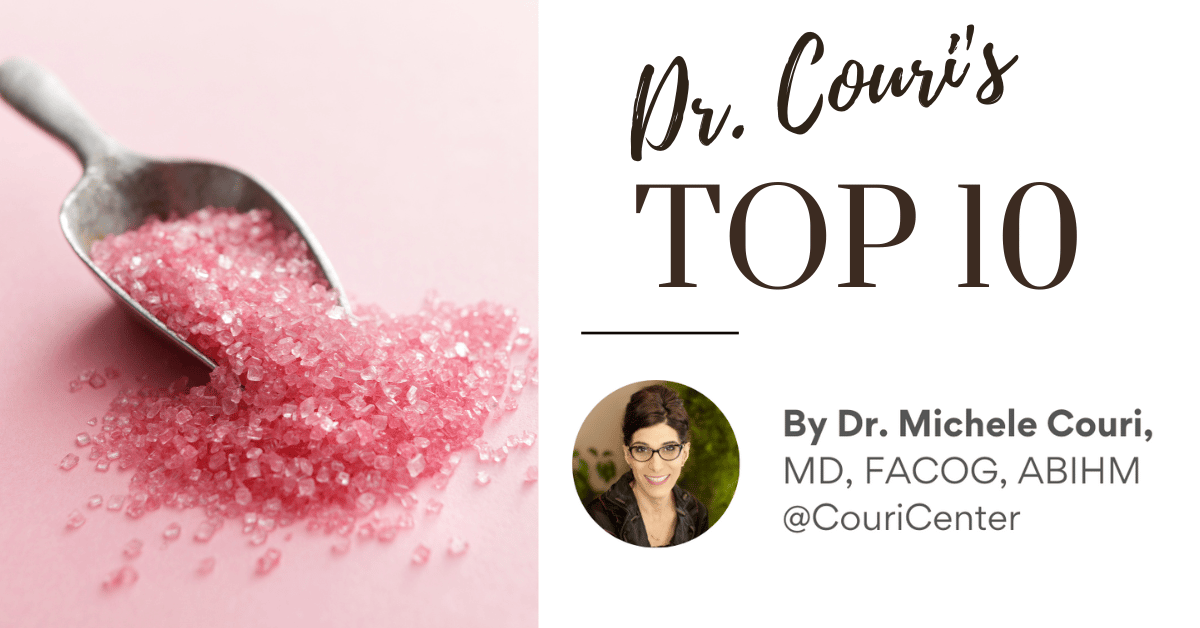July 31, 2022

10 Bittersweet Facts about Added Sugar By Dr. Michele Couri
- There is an undeniable connection between dietary sugar intake and chronic diseases, including but not limited to obesity, diabetes, cardiovascular disease, cancer, and inflammatory disorders. For clarification, I am not referring to the naturally occurring sugar in fruit or vegetables.
- Over the last 40 years, the world has seen a tripling in humans categorized as overweight or obese.
- Population data from around the world show that between 1975 and 2016, childhood obesity rates increased from <1% to 6-8%, obesity rates in men increased from 3% to >11%, and in women, from 6% to 15%. Over 2.1 billion people, roughly 30% of the global population, are overweight or obese.
- Sugar-sweetened beverages (SSBs) contribute approximately 39% of the added sugars consumed in the United States and comprise the largest source of added sugars in most Western countries. The average 12 oz (355 ml) soda contains between 35–37.5 g of sugar and delivers roughly 150 calories. The gourmet coffee drinks that are so popular contain anywhere between 40-80 grams of sugar and pack in a whopping 300-600 calories. 70% of the coffee consumed by millennials is in the form of gourmet beverages, and the sugary caramel macchiato is the most searched coffee drink in America.
- The American Heart Association recommends that women limit sugar consumption to 6 teaspoons (25 grams) per day and men to 9 teaspoons (36 grams) per day. The 2020-2025 USDA and HHS dietary guidelines recommend that children ages 2 and older limit added sugars to less than 10% of calories per day and avoid added sugars for infants and toddlers ages 2 and under.
- There is a linear association between intake of sugar-sweetened beverages and cardiovascular disease. Each one-serving per day increase in SSB intake is associated with an 8% higher risk of CVD.
- A 2015 study funded in part by the NIH found that 68% of all US barcoded food products have added sweeteners, of which 63% contained a caloric sweetener.
- In children, the most common sweetened beverages are non-diet soft drinks, fruit juices, and sports/energy drinks. A 32 oz. sports drink contains between 56 and 76 grams of sugar. However, the good news is that between 2003 and 2016, calorie intake from SSBs decreased by more than half among children (2–19 years) and by almost half among adults (≥20 years).
- Excessive sugar intake is related to both cancer incidence and survival. A 2021 study of over 8,000 women with breast cancer showed that higher sugar-sweetened beverage consumption among breast cancer survivors was associated with higher breast cancer-specific mortality and death from all causes.
- A life without the simple pleasures we enjoy would be quite mundane, but remember, for sugar and all our other vices, moderation is the key to happiness and health.
If you need help breaking your sugar addiction, we’re here to help. Schedule a consultation today or call 309-692-6838. New patients are welcome!
To Your Health,
Dr. Couri
Sources Used:
- V. Malik and F. Hu. The role of sugar-sweetened beverages in the global epidemics of obesity and chronic diseases. Nat. Rev. Endocrinol. 2022; 18(4): 205–218.
- B. Popkin and C. Hawkes. The sweetening of the global diet, particularly beverages: patterns, trends and policy responses for diabetes prevention. Lancet Diabetes Endocrinol. 2016 February ; 4(2): 174–186.
- B. Marriott et al. Trends in Intake of Energy and Total Sugar from Sugar-Sweetened Beverages in the United States among Children and Adults, NHANES 2003–2016. Nutrients 2019 Aug 25;11(9):2004.
- Our team spent 300+ hours on research. Here’s what we learned about coffee statistics in the USA. Posted in Coffee on March 1, 2022 by Urban Bean Coffee Team.
- S. Bowman, et al. Added Sugars in American Children’s Diet: What We Eat in America, NHANES 2015-2016. Food Surveys Research Group Dietary Data Brief No.26. December, 2019.
- M. Farvid, et al. Consumption of sugar-sweetened and artificially sweetened beverages and breast cancer survival. Cancer. 2021 Aug 1;127(15):2762-2773.
